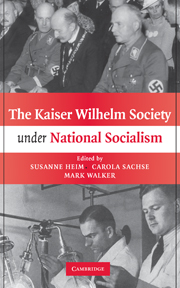Book contents
- Frontmatter
- Contents
- Tables
- Illustrations
- Editors
- Contributors
- Abbreviations
- Archives
- 1 The Kaiser Wilhelm Society under National Socialism
- SECTION I RESEARCH AND PERSONNEL POLICIES
- SECTION II RACIAL RESEARCH
- SECTION III EASTERN RESEARCH, LIVING SPACE, BREEDING RESEARCH
- SECTION IV MILITARY RESEARCH
- SECTION V THE POSTWAR “POLITICS OF THE PAST”
- 15 “Whitewash culture”: How the Kaiser Wilhelm/Max Planck Society Dealt with the Nazi Past
- 16 The Pedecessor: The Uneasy Rapprochement between Carl Neuberg and Adolf Butenandt after 1945
- Bibliography
- Index
16 - The Pedecessor: The Uneasy Rapprochement between Carl Neuberg and Adolf Butenandt after 1945
Published online by Cambridge University Press: 29 July 2009
- Frontmatter
- Contents
- Tables
- Illustrations
- Editors
- Contributors
- Abbreviations
- Archives
- 1 The Kaiser Wilhelm Society under National Socialism
- SECTION I RESEARCH AND PERSONNEL POLICIES
- SECTION II RACIAL RESEARCH
- SECTION III EASTERN RESEARCH, LIVING SPACE, BREEDING RESEARCH
- SECTION IV MILITARY RESEARCH
- SECTION V THE POSTWAR “POLITICS OF THE PAST”
- 15 “Whitewash culture”: How the Kaiser Wilhelm/Max Planck Society Dealt with the Nazi Past
- 16 The Pedecessor: The Uneasy Rapprochement between Carl Neuberg and Adolf Butenandt after 1945
- Bibliography
- Index
Summary
I always countered the “gossip” … that there was something improper about your takeover of the KWI for Biochemistry. If a vacant post is offered to someone, they should take it without misgivings. That goes without saying. You will have noticed that also in the United States nobody harbors any resentment against you. You have won favor everywhere – not least among the women.
In this passage in a letter written to Adolf Butenandt in April 1954, Carl Neuberg was alluding to a dark chapter in the relationship between the two scientists. The National Socialists' ouster of his predecessor and Neuberg's subsequent exile from Germany played a significant part in Butenandt's achieving his distinguished career in the Kaiser Wilhelm Society (Kaiser-Wilhelm-Gesellschaft, KWS) and Max Planck Society (Max-Planck-Gesellschaft, MPS). Yet, the manner in which Neuberg himself exonerated Butenandt for taking over the Kaiser Wilhelm Institute for Biochemistry (KWI für Biochemie, KWIBC) illustrates the remarkable nature of postwar relations between German scientists and their exiled colleagues. The facts of the case require careful interpretation, looking beyond the conciliatory façade of mutual esteem.
At the time of his expulsion, Neuberg was certainly bitter. Yet two decades later he seems to have raised the issue out of the blue while writing this letter. Up until then, Butenandt had neither directly enquired about the attitude of his American colleagues toward him nor had he mentioned the existence of what Neuberg describes as “gossip.”.
- Type
- Chapter
- Information
- The Kaiser Wilhelm Society under National Socialism , pp. 400 - 418Publisher: Cambridge University PressPrint publication year: 2009



